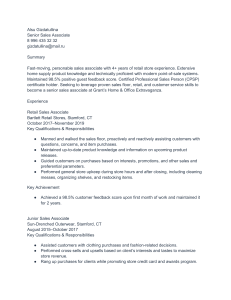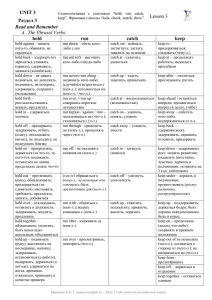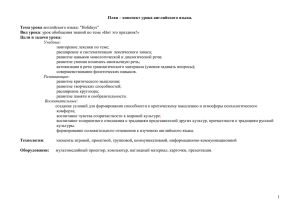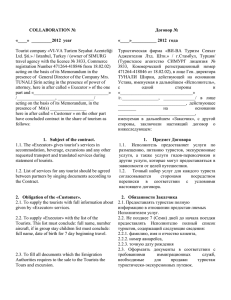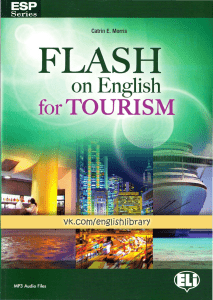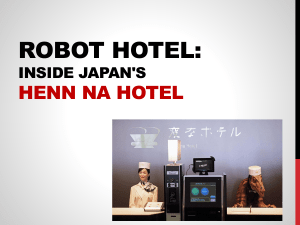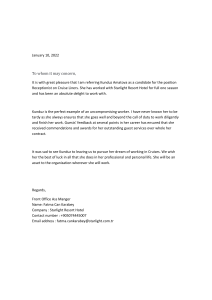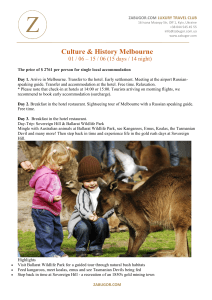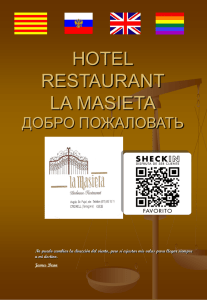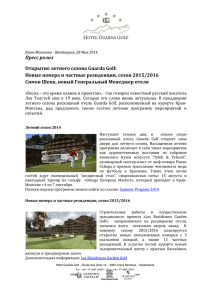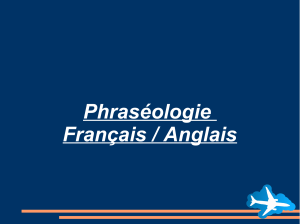Unit 3 The Retail Travel Agent (Раздел 3. Работа туристического агента)
реклама
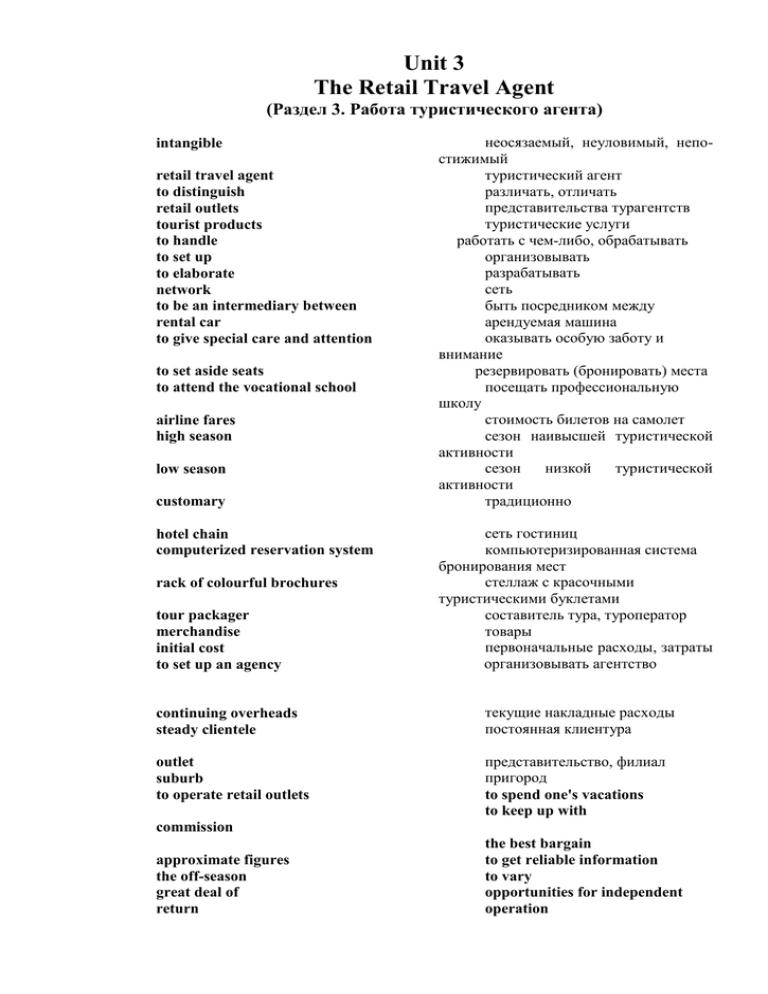
Unit 3 The Retail Travel Agent (Раздел 3. Работа туристического агента) intangible retail travel agent to distinguish retail outlets tourist products to handle to set up to elaborate network to be an intermediary between rental car to give special care and attention to set aside seats to attend the vocational school airline fares high season low season customary hotel chain computerized reservation system rack of colourful brochures tour packager merchandise initial cost to set up an agency неосязаемый, неуловимый, непостижимый туристический агент различать, отличать представительства турагентств туристические услуги работать с чем-либо, обрабатывать организовывать разрабатывать сеть быть посредником между арендуемая машина оказывать особую заботу и внимание резервировать (бронировать) места посещать профессиональную школу стоимость билетов на самолет сезон наивысшей туристической активности сезон низкой туристической активности традиционно сеть гостиниц компьютеризированная система бронирования мест стеллаж с красочными туристическими буклетами составитель тура, туроператор товары первоначальные расходы, затраты организовывать агентство continuing overheads steady clientele текущие накладные расходы постоянная клиентура outlet suburb to operate retail outlets представительство, филиал пригород to spend one's vacations to keep up with commission approximate figures the off-season great deal of return the best bargain to get reliable information to vary opportunities for independent operation содержать фирмы, осуществляющие работу непосредственно с клиентами комиссионное вознаграждение, комиссионные приблизительные цифры мертвый сезон большое количество, большой объем доход, прибыль проводить свой отпуск быть постоянно в курсе дел относительно наиболее выгодная сделка, покупка получать достоверную информацию меняться, изменяться, варьировать возможности работать самостоятельно Warming up Task 1 Work in pairs. Discuss the following points. 1. What do the terms: high season and low season refer to? 2. What kind of product is sold by retail travel agents? 3. What is a commission? 4. How does a commission relate to travel agents? Vocabulary focus Task 1 Read and translate the following international words: department tourism separate assistance category total general absorb establishment manufacturer agent airplane typical excursion computerization public local clientele industry reservation special agency different fundamental brochure display executive modern service rental complex segment channel illustrate initial satisfy Task 2 Match the words or word-combinations with their definitions. 1. 2. 3. Accommodation Tour operator Destination 4. Health resort 5. 6. 7. Trip Independent traveller Transfer 8. Merchandise a) things for sales; goods for trade b) a town catering for those who wants to cure an illness c) a tour on which you become acquainted with another country d) hotels, guest houses, holiday apartments etc. e) one who assembles various services into one package f) transportation to and from the airport g) a tourist who is travelling on his own rather than a member of a group h) the place where the journey ends Task 3 Fill in the blanks with suitable words or word-combinationi from the box below. include handled language skills a great deal of remains the entire range of deal with independent department stores destinations emphasis 1. There is some difference in emphasis in the kind of businesi ______by travel agents offered in the major tourist marketi and those in the major tourist_____. 2. In the market areas, the_____is on selling travel services tours to people who are going to some other place. 3. The agencies in the tourist destinations often put_____emphasis on services the traveller will need while he_____ in the area. 4. These services______local sightseeing tours, arrrangement for_____travellers and so on. 5. Since the agencies in some tourist areas_____many foreigners,_____are often more important than in the market areas. 6. It should be noted that many places are both tourist and market areas that offer_____ travel services. 7. Amerісаn Express offices in such places as Paris and Rome may well be described as travel______. Task 4 Match the words and word-combinations on the left with their Russian equivalents on the right. 1) 2) 3) 4) tangible goods retail outlet to be an intermediary be tween to be compulsory 5) successful conclusion of one's training 6) corresponding growth 7) to offer inducement to smb. 8) to set up an elaborate network of 9) to use the services of smb. 10) one-stop convenience 11) low season fares 12) to absorb advertising cost 13) to be shared with smb. 14) large quantities of merchandise 15) initial cost of setting up an agency 16) to establish a steady clientele 17) to assure repeated business 18) to branch out 19) to be paid by means of commissions 20) to bring in higher returns 21) to offer the best bargain 22) to keep up with changing fares 23) to be on alert for a) быть обязательным b) быть посредником между c) филиал турагентства d) возможность оформления всего комплекса услуг в одном месте e) пользоваться услугами f) стоимость билетов в сезон низкой туристической активности g) брать на себя расходы на рекламу h) создавать постоянную клиентуру i) гарантировать установление постоянных контактов с клиентами j) открывать филиалы k) оплачиваться комиссионными 1) быть в курсе изменений в оплате за проезд m) внимательно следить за кем-либо n) предлагать наиболее выгодную сделку o) приносить высокие доходы p) создавать стимулы q) соответствующий рост r) материальные товары s) успешное окончание обучения t) быть поделенными между u) большое количество товара v) первоначальные расходы по созданию агентства w) создавать хорошо организованную сеть Reading Task 1 Read the text and translate it For help see the vocabulary notes that follow the text. Part I Retail travel services are similar to department stores, except that they sell intangible services rather than tangible goods. The retail travel agent sells all kinds of tourist products transportation, accommodations, sightseeing, and so on - to the general public. The term 'retail' distinguishes him from the tour operator or packager, who can be considered the manufacturer or wholesaler of the tourist industry. However some of the tour operators also operate retail outlets. The travel agent is an intermediary between clients and principals (tour operators). He works in travel agencies, with tour operators, in the tourist offices of spars and health resorts, in communal tourist offices as well as in tourist information bureaus. If you want to become a travel agent in one of the EU countries no special school qualifications are compulsory. The training depends on your educational level, therefore your contract of apprenticeship may be for two, two and a half or three years. During your training you will attend the vocational school in special classes for travel agents. Lessons may be given as day release or block release. The final examination of the Chamber of Industry and Commerce certifies the successful conclusion of your training. As with many other aspects of modern tourism, the growth of the airlines led to a corresponding growth in the number of retail travel agents. The airlines offer inducements to travel agents to handle reservation for them so that the airlines do not have to set up an elaborate network of ticket offices in all the areas from which they draw passengers. Even where the airlines do have ticket offices, many travellers still prefer to use the services of an agent. The agent of course offers the customer one-stop convenience. The traveller can make all the arrangements for his trip without having to go to separate places for his airplane seat, his hotel reservation, his rental car, and whatever else he may want for his trip. In return for the customers who -are brought by the agencies, the airlines give special care and attention to the agents. The typical airline reservations office has one or more agents who handle nothing but travel agency business. They may set aside seats on some popular flights just for the agencies. They also give assistance to the travel agents in working out fares. Airline fares have become very complex in recent years, with a great variety of special categories - high season and low season fares, or 21-day excursions and 45-day excursions, family plans, and many others besides the customary price difference between first-class and economy. The problem becomes even more complicated when the trip has several legs - different segments of the trip on different flights, often on different airlines. The routing of particular trip also frequently makes a difference in the total fare. Computerization caused fundamental changes in the travel agency business. The airlines and the hotel chains all over the world and all resort areas now have computerized reservation systems. As packaged tours have assumed importance in the tourist industry, retail travel agents have become the principal channel for selling tours to the general public. A typical travel agency has a rack of colourful brochures that illustrate the delights offered by a wide variety of tours. The cost of this kind of promotion is paid for almost entirely by the tour packagers. They prepare, print, and distribute the brochures, and they also absorb the national, or even sometimes international, advertising cost. The retail agencies may do some local advertising, although even in this case costs may be shared with tour packagers or transportation companies. The agencies also make direct mailings to lists of customers who might be interested in particular travel offerings. The travel agency business offers many attractions to people with experience in the tourist industry. Unlike most other retail businesses, there is no need for the storage and display of large quantities of merchandise. This means that the initial cost of setting up an agency and the continuing overheads are low in comparison with other retail establishments. A good location, however, is an important factor in the success of an agency, and so office space may be expensive. Another factor in success involves establishing a steady clientele. The best customer for a travel agent may be a corporation whose executives make a large number of business trips every year. For customers who come in off the streets, satisfying their travel needs is the best way to assure repeated business. Some of the large travel companies have already operated on a chain basis, that is, with several outlets for many years. Now the smaller agencies are also branching out. Some of them have opened offices in different parts of the same city or its suburbs, while others have opened offices throughout an entire region. Vocabulary notes on the text to offer іnducements to apprenticeship one-stop convenience to work out fares several legs principal channel general public delights offered by wide variety travel offerings to absorb advertising cost to share costs with retail establishment customers off the street to satisfy one's travel needs in the best way to assure repeated business to branch out to handle reservation to give special care and attention to (the agents) growth in the number of зд. делать заманчивые предложения зд. работа стажером зд. возможность оформления всего комплекса услуг в одном месте зд. определять (рассчитывать) стоимость проезда зд. несколько этапов зд. основной способ зд. рядовые граждане зд. иллюстрирующие предлагаемые развлечения большое разнообразие предложения по турам зд. брать на себя стоимость рекламных услуг нести расходы вместе с малая туристическая фирма зд. случайные клиенты зд. удовлетворять запросы, касающиеся организации путешествий наилучшим образом зд. добиваться, чтобы клиент стал постоянным зд. открывать, организовывать новое представительство или филиал зд. может заниматься бронированием и предварительной продажей билетов окружать (турагентов) особой заботой и вниманием увеличение числа Task 1 Look through the text and find the English equivalents for: продавать услуги туристические услуги отличаться от чего-либо представительство турагентства быть посредником между кем-либо делать заманчивые предложения турбюро в маленьком населенном пункте туристическое информационное бюро быть обязательным проводить все занятия по предмету в один день организовывать разветвленную сеть представительств резервировать места нести расходы вместе с кем-либо текущие накладные расходы повсеместно открывать филиалы Task 2 Look through the text and give the Russian equivalents for the following phrases: intangible services to operate retail outlets spars and health resorts successful conclusion to offer inducements to to handle reservation to set up a network of one-stop convenience separate places to set aside to work out fares in recent years high season fares hotel chain the principal channel for tourist product to illustrate the delights offered to absorb the national advertising cost to share costs with particular travel offerings large quantities of merchandise the continuing overheads office space to establish a steady clientele to come in off the street to assure repeated business Task 3 Read the second part of the text and translate it. For help see the vocabulary notes that follow the text. Part II The retail travel agent is paid by means of commission - percentages of sales made through the agency. The commission varies from country to country and from time to time. However, some approximate figures would be about 7.5% for sales of tickets on the scheduled airlines, from 5 to 15% from hotels (although some resort hotels may pay even higher commission, especially in the offseason), about 10% for tours on the scheduled airlines, and about 5% for charter tours. These figures indicate a rather small margin, since they constitute the bulk of the business for a great many agents. Some kinds of activity provide a higher rate of return, however. Travel insurance, which many agents handle, may bring in commission of 25% or more. Tour arrangements for independent travellers also bring in higher returns. The transportation and accommodation companies pay these costs directly to the agents. The retail travel business involves a great deal of contact with the public, since travel agents are selling services and not goods. Many of their customers expect them to either advise them on where they should spend their vacations, or to advise them on hotels, restaurants, health problems, and so forth in all parts of the world. Among the ways in which the agent Can serve the customer is by keeping up with changing fares so that he can offer his customers the best bargain. He can also serve them by knowing where he can get reliable information and by helping them to work out complicated fares. The agent must keep up with changing government regulations for international travel via health regulations, customs information, airport taxes - so that he can give the traveller accurate information. The agent must even be alert for possible political problems in the tourist destination countries. One of the primary necessities for recreational travellers is personal safety. There are of course many rewards other than the financial ones for the travel agent. They involve, for instance: an opportunity to do a great deal of travelling themselves, a possibility to deal with the public and to serve their needs and opportunities for independent operation that would not be found in a large corporation. Vocabulary notes on the text to constitute the bulk of the busi ness complicated fares and so forth accurate information to bring in higher returns rather small margin to be alert for possible political problems reward зд. составлять основную часть работы зд. комплексные расчеты платы за проезд и так далее точная, проверенная информация приносить более высокие доходы, прибыль незначительная разница в размерах зд. Быть постоянно готовым к возникновению проблем политического характера зд. выгоды Task 1 Look through the text and find the English equivalents for the following phrases: получать комиссионные мертвый сезон быть в курсе дела относительно чего-либо заключать выгодную сделку приносить высокий доход отдыхающие туристы являться первейшей необходимостью давать рекомендации относительно чего-либо возможность получения всего комплекса услуг в одном месте осуществлять страхование путешествия быть постоянно готовым к чемулибо возможность работать самостоятельно офисные площади Task 2 Look through the text and give the Russian equivalents for the following phrases: to be paid by means of commission to give accurate information to handle travel insurance tour to be alert for arrangements recreational traveller high returns primary necessities a great deal of to deal with to offer the best bargain to serve one's needs to get reliable information Task 3 Look through the whole text and match the words on the right with the attributes on the left 1) retail Z) department 3) tangible 4) tour 5) tourist 6) information 7) travel 8) level 9) vocational 10) final 11) successful 12) modern 13) elaborate 14) one-stop 15)rental 16) special 17) airline 18) popular 19) high 20) customary 21) hotel 22) packaged 23) particular 24) initial 25) entire a) operator b) outlet c)services d) store e) educational f) agent g) office h) bureau i) convenience j) car k) care 1) school m) examination n) conclusion o) tourism p) network q) price difference r) chain s) tour t) offerings u) cost v) region w) season x) flights y) fares Task Say what statements are true and what ones are false. Comment on the true statements and correct the false ones. 1. All retail travel agents also operate as tour packagers or operators. 2. Many travellers prefer to go to travel agents to conveniently make all their arrangements at the same place. 3. The airlines treat travel agents just like any other customers. 4. Airline fares are so easy to figure out that there is never any need for a travel agent to get expert help. 5. All transportation and accommodation companies now use computers to keep track of their reservations. 6. Even with a computer terminal in the office, it takes several days for a travel agent to confirm reservations. 7. Packaged tours are sold only through large travel companies like American Express. 8. Advertising costs in the tourist industry are paid for entirely by local travel agents. 9. All travel agencies in all locations throughout the world emphasize the same kinds of services. 10. The initial cost of setting up a travel agency is very high. 11. The location of a travel agency is an important factor in its success. 12. Many travel agencies have begun to open branches within the same city or region. 13. The customer pays the travel agent directly for all the services that are purchased through the agency. 14. A travel agent does not have any direct contact with the public. 15. One of the rewards of being a travel agent is the opportunity to do a great deal of travelling. Task Insert the corresponding English word-combinations for the Russian components in brackets. 1. The term retail distinguishes (туристический агент) from the tour operator or packager, who can be considered the manufacturer or (организатор оптовой торговли) of the tourist industry. 2. The travel agent is (посредником между клиентом) and tour operator. 3. Some of the tour operators also (содержат фирмы, осуществляющие индивидуальную работу с клиентами). 4. If you want to become a travel agent in (одной из стран Европейского Союза) no special school qualifications are (обязательны). 5. The airlines offer inducements to travel agents to (оформлять предварительные заказы) for them. 6. Airlines do not have (организовывать разветвленную сеть билетных касс) in all the areas from which they draw passengers. 7. The agent of course offers the customer (возможность оформления всего комплекса услуг в одном месте). 8. The traveller can make all the arrangements for his trip without having to (ходить в разные места) for his airplane seat, his hotel reservation and his rental car. 9. (В качестве ответной меры за) the customers who are brought by the agencies, the airlines (окружают особой заботой и вниманием) to the agents. 10. The airlines also give assistance to the travel agents in (определение стоимости за проезд). 11. A typical travel agency has a rack of colourful brochures that (иллюстрирующие предлагаемые развлечения) offered by a wide variety of tours. 12. (Первоначальные расходы) of setting up an agency and the (текущие накладные расходы) are low in comparison with other retail establishments. 13. Another factor in (успех) involves establishing а (постоянная клиентура). 14. The retail travel agent is paid (при помощи комиссионных) - percentages of sales made through the agency. 15. Some kinds of activity (приносят более высокие доходы), however. 16. (Страхование путешествия), which many agents handle, may (приносить) commission of 25% or more. 17. Among the ways in which the agent can serve the customer is by (находясь в курсе дел относительно) changing fares so that he can offer his customers the best (сделка). 18. One of the primary necessities for recreational travellers is (личная безопасность). Reading and discussion Task 1 Read the text and translate it For help see the vocabulary notes that follow the text. Make sure your customer has the best possible insurance every time he goes away. Particularly in the case of trip abroad, the situation can arise which hardly anyone would have thought possible before they went. But if you have advised your customer to take out travel insurance before going, then you benefit, too. There is nothing worse than being held responsible for situations outside your control. A suitcase may go missing, a holiday may have to be cancelled but still paid for, someone may have an accident far away from home - all situations designed to make life difficult; unless, that is, you have sold your customer a travel insurance package to cover every eventuality. The travel insurance packages valid for Europe or worldwide comprise the following benefits: 1. Health insurance 2. Personal accident 3. Personal liability 4. Luggage insurance Financial compensation for medical care abroad in the case of sudden illness or accident. In case of death, disability (loss of one or more limbs and/or sight of one or both eyes), permanent total disablement, transport to hospital or back home (air rescue service). Indemnity against legal liability for accidental injury to third parties or for damage to their property. Loss of or damage of personal belongings during the journey. 5. Assistance service Payment of the following expenses: in case of illness/accident cost for the arrangement and transport back home for the ill or dead insured, the cost of burial in the country abroad where death occured, the cost advance and settlement for hospital expenses, the cost for arranging for relatives to visit the hospital, curtailment and delayed return travel in case of illness/accident, assistance and advance if cash, travel tickets, passports are lost, legal advice in case of arrest or problems with the police. In order to complete the insurance protection the travel agent should recommend a cancellation insurance. This relieves the client of the responsibility for the payment of cancellation cost, and covers all additional expenses, should the client be forced to depart earlier or later than planned. Moreover, it entitles the client to a refund of unused or partly used services. This applies in case of illness, death, injury, or maternity, or illness of any member of your close family at home or of the party travelling with you, or in case of fire, storm, floods or malicious damage rendering the client's home uninhabitable. Vocabulary notes on the text to make sure to be held responsible for to be valid for medical care disability permanent total disablement air rescue service loss of sight indemnity against legal liability liability for accidental injury to third parties убедиться считаться ответственным за быть действительным в течение медицинская помощь потеря трудоспособности, нетру доспособность постоянная полная нетрудоспособность зд. спасательная служба авиалиний потеря зрения liability for damage to one's property loss of or damage of personal belongings in case of illness/accident insured страхование ответственности ответственность перед третьими лицами за причиненный вред здоровью в результате несчаст ного случая cost of burial arranging for relatives to visit the hospital curtailment and delayed return travel advance insurance protection (cover) to depart earlier or later cancellation insurance to entitle the client to refund of unused or partly used services давать клиенту право in case of death, injury, or maternity close family to render one's home uninhabitable ответственность за ущерб, причиненный собственности пострадавшего утеря или повреждение личных вещей при болезни или несчастном случае застрахованный (гражданин) стоимость похорон организация посещения больницы родственниками досрочное или более позднее возвращение из турпоездки ссуда денег страховое обеспечение уехать раньше или позже страхование на случай расторжения договора страхования возмещение стоимости неиспользованных или частично использованных услуг в случае смерти, травмы или родов близкие родственники делать чей-либо дом непригодным для проживания Additional reading Task 1 Read the text and translate it. For help see the vocabulary notes that follow the According to data issued by the Finance Ministry, there are around 1,300 insurance companies currently operating on the Russian market. The total volume of money paid for insurance in 1999 was 2.3 times greater than in 1998. A very important contribution to the insurance industry was the decree President Yeltsin signed in 1997. The decree made it mandatory for all people travelling abroad to have insurance in case they had health problems or encountered various other incidents while on their trip. Also, many countries in Europe, as well as the US and Japan, require! Russian tourists to have an insurance policy. Though these regulations have been in place since 1997, everyone knows that all domestic transport providers — from long-distance buses to airplanes - are obliged to purchase insurance to protect their passengers on routes that take the travellers more than 50 kilometers from the city of departure. In case of an accident, the insurance company has to pay compensation to the passengers who have suffered. However, this mandatory insurance doesn't involve huge compensation packages - no matter what happens, the amount of the insurance company is required to pay out to each passenger cannot exceed 120 minimum wages. Compared to travel-insurance policies in the West, which cover anything from suitcase damage to medical evacuation by airlift, Russian travel insurance firms offer only a narrow set of services to clients going abroad. The problem is the local mentality. Russians don't like to think about what may happen in the future, and many people buy insurance just because it's required by law. The insurance culture in Russia in still quite underdeveloped. In comparison to many other insurance firms, East European Insurance Co. has a relatively ample array of policies - at least for a Russian insured. Besides standard medical insurance, EEIC sells a policy that will cover the costs of bringing children back to Russia if something happens to the parents while they are travelling together. If the tourist intends to travel by car, EEIC offers car-repair insurance, and the policy covers the passengers' return to Russia if the car breaks down for good. Also, the car policy covers legal fees up to 5,000 dollars if there's a car accident and the person has to go to court. American insurer AIG (American Insurance Group), which has been operating on the Russian market since 1995, besides medical insurance for tourists, also offers life insurance, personal and third-party liability insurance and luggage insurance - a package akin to those commonly offered in the West. One of the largest Russian insurance companies, Pro-myshlenno-Strakhovaya Kompaniya, caps compensation for lost or stolen luggage at $500, though it offers to help find documents - such as passports - in case of their loss while travelling. These services are included in the main insurance package, which costs $1.50 per day. PSK also sells policies to cover situations when a tourist cannot go on his planned journey because of unexpected and serious circumstances. The types of cases insurers have encountered with their clients vary radically - from a routine trip to the dentist to heart surgeries in remote destinations. The Moscow Times, November 10, 2000 Vocabulary notes on the text currently to make mandatory domestic transport providers long-distance buses to suffer to purchase insurance to be obliged mandatory insurance to exceed suitcase damage to pay out to each passenger medical evacuation by airlift narrow set of services to be underdeveloped ample array of policies car-repair insurance to break down for good legal fees third-party (liability) insurance for lost or stolen luggage in case of their loss while travel ing policy to cover situation when в данный момент, сейчас объявить обязательным, обязать зд. российские транспортные предприятия автобусы дальнего следования зд. пострадать в результате несча стного случая приобретать страховку быть обязанными обязательное страхование превышать повреждение ручной клади выплачивать каждому пассажиру перевозка больного воздушным транспортным средством зд. скудный перечень услуг быть слаборазвитым зд. богатый выбор страховых полисов страховка на случай поломки транспортного средства of unexpected and serious circumstances a routine trip to the dentist in remote destinations зд. полностью выйти из строя, не подлежать восстановлению судебные издержки страхование ответственности перед третьими лицами за утерянный или украденный багаж в случае их утери во время путешествия страховой полис на случай, если из-за неожиданно возникших и серьезных обстоятельств обычный визит к зубному врачу зд. в самых удаленных местах отдыха Unit 4 Dealing with Customers (Раздел 4. Работа с клиентами) sales conversation set pattern to maintain rapport sales environment enquiry to deal with properly and in an appropriate manner to volunteer to purchase subsequent dealings to find out exactly response to elicit to investigate to complain complaint otherwise to make a sensible suggestion to establish (discover) the client's priorities (needs) to get value for money to guess smth. from smth. unless you feel that price range the holiday to have the whole picture to have smth in mind to summarise the facts to draw one's attention to to appeal to the client to create a desire in the client the price chart rapport franchise деловой разговор с клиентом стандартная модель, образец поддерживать психологический контакт атмосфера совершения сделки запрос, просьба, пожелания решать должным и соответствующим обстоятельствам образом проявлять готовность что-либо делать покупать последующие сделки выявлять точно ответ, реакция, реплика выяснять, узнавать, определять подробно расспрашивать, выяснять детали высказывать недовольство, предъявлять претензии, жаловаться жалоба, недовольство, претензия иначе, в противном случае давать разумный совет, делать разумное предложение выяснять предпочтения (потребности) клиента получить качество, соответствующее затраченной сумме денег делать предположение о чем-либо на основании чего-либо пока вы не почувствуете, что диапазон цен отдых во время отпуска иметь полное представление собираться сделать что-либо обобщать факты привлечь внимание к быть привлекательным для клиента создавать у клиента желание прейскурант цен психологический контакт привилегия, выдаваемая корпора цией дилеру на право торговой деятельности в определенном районе ordinary manner information type real sensible budget relax selective personalising element established especially check contain suggest financial concentrate brochure product presentation volunteer effectively respondent material important client appeal benefit refer Task 2 Match the words or word-combinations with their definition. 1) rapport 2) an open question 3) client with 'yes' or 'no' g) reservations made by guests before they arrive h) to agree to a booking, offering 4) a respondent 9) available 5) a closed ques tion 6) price chart 10) members of staff 11) to confirm 7) to deal with 12) advance reservations 8) customer a) customer b) the person who answer questions c)the relationship with the customers d) the question that can not be answered with 'yes' or 'no' e) price list f) the question that can be answered i) company j) k) agency I) people who work in a firm, ready for use person using services of a travel to work with, to handle Task 3 Fill in the blanks with suitable words: recreational parent withdrawn contain auditoriums maintain social designed facilities primarily franchise to run health 1. Some of the hotel corporations operate on a_____basis. 2. That means the hotel and its operation are_____by the corporation, but the right_____it is sold or leased. 3. The operator then pays a percentage to the_____ corporation. 4. His franchise can be_____, however, if he does not_____ the standards that have been established. 5. Other hotel companies serve______as managers. 6. Large, modern hotels_____ not only guest rooms, but many other_____as well. 7. They usually contain restaurants and cocktail lounge, shops, and_____facilities such as swimming pools or______clubs. 8. Many hotels also have facilities for_____functions, conventions, and conferences - ballrooms,_____ meeting rooms, exhibit areas, and so forth. Task 4 Match the words on the left with their Russian equivalents on the right. 1) sales conversations a) полный набор услуг 2) set pattern b) обобщать факты 3) to build up the relationship with a customer c) соответствие курорта запросам клиента 4) to feel at ease d) убеждать клиента 5) to establish the client's needs e) состоять из четырех частей 6) to volunteer information f) выявлять предпочтения клиента 7) a closed question g) предлагать путевку на отдых 8) to force the respondent to do smth. h) стандартная модель 9) an open question i) деловой разговор с клиентом 10) to suggest a holiday j) устанавливать с клиентом контакт 11) to establish the client's priorities k) чувствовать себя непринужденно 12) to fall into four parts 1) общий вопрос 13) to keep within a budget m) специальный вопрос 14) to get value for money n) заставлять респондента делать 15) to persuade the client to o) удовлетворять потребности клиента 16) suitability of a resort p) привлекать внимание 17) to summarise the facts q) создавать у клиента желание купить 18) a whole host of facilities r) не превышать определенной суммы 19) to match the client's needs s) получать качество, соответствующее заплаченной сумме денег 20) to draw one's attention t) добровольно делиться информацией 21) to create a desire in the client to buy u) выявлять потребности клиента Task I Read the text and translate it. For help see the vocabulary notes that follow the text Part I All sales are made through the sales conversations. A sales conversation is different from an ordinary conversation because it has an objective, an aim, which is to sell the product, and so must follow a set pattern which always includes the same four elements in this order. These are rapport, questioning, presentation and commitment. Rapport is the relationship which is built up with the customers. They must feel at ease in the sales environment and confident that the enquiry will be dealt with properly and in an appropriate manner. Of course, rapport must be maintained throughout your dealing with the customers, right through the sale and into any subsequent dealings. However it must be established before questioning can take place. Why do we need to question the client? We need to establish the client's needs. We can not sell a holiday if we do not know what type of holiday he wants. Sometimes clients will volunteer this information themselves, especially when they have already made their choice, have chosen the product they wish to purchase. But in a real sale your first task is to find out exactly what they are looking for and the best way to do this is to question effectively. There are two types of questions: open and closed questions. The closed question is the one that invites a 'no1 or 'yes' response. An open question is one that can not be answered with 'no' or 'yes'. For instance: 'Do you prefer to travel first class?' is a closed question, whereas 'What kind of travel do you prefer?' is an open question. There are times when you will need to use closed questions, especially when you are checking information, but in the beginning you will find open questions much more effective. It forces respondents to give more information, to explain more fully what they require. In this way you are able to elicit what they really want to buy. An open question always begins with one of the seven W-words - so-called because they all contain the letter W: when, where, who, how, which, what and why. To be able to sell your product you need to be able to establish what their material and human needs are. You'll discover the material needs by asking such questions as 'Who will be travelling?', 'How long for?', 'When do you want to go?' Human needs are catered for with 'what' questions: 'What sort of holiday do you want?', 'What are your hobbies?1 Human needs as well as material needs must be part of your investigation before you suggest a holiday. Otherwise you will not have the whole picture and will not be able to make a sensible suggestion. You must also establish the client's priorities. Everyone considers one part of their travel requirement to be the most important. These fall into four main types: people and their requirements, the place, the price and the period. Concerning price: of course it is often difficult to talk about money. But everyone tries to keep within a budget and wants to feel that they are getting good value for their money. It's unwise to guess from a person's appearance his financial standing. That's why it is advisable to use questions such as 'What type of accommodation are you looking for?1 and 'What price range do you have in mind?' You will not need to ask the question 'why' unless you feel that it is necessary to persuade the clients to change their views as to the suitability of a resort or holiday. Before beginning the presentation stage you should always check the information and summarize the facts, then present the holiday you wish to sell. Remember that when presenting the product, the particular holiday that the client is not buying the hotel bedroom but what it can do for him. For instance, the client who buys a two-week holiday in a hotel in Sochi is not buying the hotel bedroom so he can admire the wallpaper but because it is near the beach, it has the facilities he needs to help him relax for two weeks. So match the client's needs with the holiday on offer, and concentrate on the features of the facilities which the client requires. You may choose to show the client a hotel which has a whole host of facilities but do not draw his attention to all of them. It will only confuse. Instead, concentrate on those that will appeal to the client, those that you know he wants or would like. In order to make product sound attractive and appealing, ideally suited to his needs, be selective. If you include unnecessary information he may feel that this holiday is not suitable for him after all. So present the features in the brochure as benefits. A feature of a hotel is that it is only 200 meters from the beach, while a benefit to the client is the fact that he can get to the beach easily as it is only 200 meters away. By personalizing the product in this way you create a desire in the client to buy the product. It is not sufficient just to read out the facilities that the client requires out of the brochure. However it should be referred to. But do not read it out to the client; rather talk about the benefits to them as you point to photos of the hotel, the price chart, the temperature grids. Use it as an aid. Then once the client shows signs of commitment, or desiring to buy, you should stop selling and close the sale. Remember that once the client agrees to the sale he is showing commitment. Vocabulary notes on the text to change one's view temperature grid to cater for whole host of facilities ideally suited to their needs to get to smth. easily to refer to smth. to show signs of commitment features of the facilities to keep within a budget to confuse suitability of a resort изменять мнение шкала годовых температур зд. обслуживать ... зд. огромный перечень условий для отдыха идеально отвечать потребностям легко добираться до зд. затрагивать что-либо зд. выказывать признаки заин- тересованности характеристики удобств не превышать определенной суммы зд. сбивать с толку зд. соответствие курорта запросам клиента Task 1 Look through the first part of the text and find English equivalents for: деловые разговоры с клиентом делать предположение о чем-либо стандартная модель на основании чего-либо психологический контакт считать что-либо для себя чувствовать себя непринужденно приемлемым устанавливать доверительные обобщать факты отношения с клиентом отдых в конкретном месте использовать соответствующую предпочесть показать клиенту ситуации манеру поведения огромный перечень условий для последующие сделки отдыха выявлять потребности клиента привлекать внимание тип отдыха казаться кому-либо привлекасделать свой выбор тельным общий вопрос идеально отвечать потребностям объяснять подробнее легко добираться до чего-либо выявлять духовные и материсоздавать у клиента желание чтоальные потребности либо сделать содержать в себе букву W зачитать перечень оборудования высказывать заботу о чем-либо затрагивать тему иметь полное представление о чемпрейскурант цен либо выказывать признаки получать качество, соответствующее заинтересованности затраченной сумме денег желание купить Task 2 Look through the first part of the text and give the Russian equivalents for the following phrases: to show signs of commitment a temperature grid sale conversation a set pattern to persuade the client to be unwise to guess from a price chart unnecessary information to summarize the facts to have the whole picture to feel at ease to deal with properly and in an appropriate manner to build up rapport with to discover one's needs to suit to one's needs to relax for two weeks to concentrate on the features of the facilities to create a desire in the client to make product attractive and appealing a whole host of facilities to draw one's attention to the suitability of a resort a price range to keep within a budget to maintain rapport with to cater for Task 3 Match the words on the right with the suitable attributes on the left. 1) sales 2) appropriate 3) subsequent 4) closed 5) first 6) material 7) human 8) sensible 9) client's 10) travel 11) financial 12) presentation 13) particular 14) unnecessary 15) price 16) temperature a) class b) needs c) suggestion d) conversation e) standing f) stage g) dealings h) manner i) question j) need k) priorities 1) requirement m) grids n) chart o) information p) holidays Task 4 Read the text and translate it. For help see the vocabulary notes that follow the text. Part II There are some of the ways that travel agency can persuade the general public to have confidence in it and to use its services. Let's look first at staff appearance. It is important that all staff j are well groomed; that their hair is neat and tidy, shoes cleaned and well polished, their uniform pressed. If a travel agent looks pleasant and professional, people will be more willing to approach him and ask for help. Many customers decide to come in on the off-chance because they have looked in the window and are impressed by what they have seen inside the shop. Once they do approach the travel agent the way he reacts is also very important. It is not necessary what he says but how he looks, it's what is called body language. Our facial expression, the way we use our hands, our body to convey what we really feel. So a travel agent has to try to maintain good eye contact with his client. This shows that he is listening. If he looks away clients will think the travel agent is no longer paying attention to them. So he needs to lean forward a little as this also shows he is concentrating on what is being said. He doesn't have to lean back as this shows he is uninterested. And he has to try not to fidget, as it can be very irritating. However, when a customer first walks into the agency he has to be given some personal space. If you include unnecessary information they may feel that this holiday is not suitable for them after all. Then the travel agent has to give the client his full attention. Imagine you are a travel agent. Then you should remember the following. In order for the customer to feel that you and the firm are efficient and reliable, listen carefully, and if possible take notes so you can refer back to them later. Maintain a professional manner throughout: that is, remember that everything that client tells you is in confidence. Never talk about one client in front of others. He also expects ypu to be loyal to your company. So never blame anyone else for an error, always give accurate information. If you are not sure of any of your facts, check them! Don't be afraid to admit if you don't know something but show that you are able to find out what is required. If you promise to find information, give it to the client at a later date, having told him when you intend to do so. And above all, remember that a client will remember the person, or the company, that not only does a good job, but who does something more than expected. Vocabulary notes on the text to have confidence in to be well-groomed to look pleasant and professional to approach smb. доверять кому-либо facial expression to maintain good eye contact with to look away to rush up to to give the customer time to browse to give the client his rail attention to be reliable to take notes to be in confidence to maintain a professional manner to be loyal to one's company to fidget to come in on the off-chance to talk about one client in front of others to blame smb. for smth. at a later date to convey быть опрятно одетым выглядеть приятно и профессионально подойти (приблизиться) к выражение лица поддерживать хороший визуальный контакт смотреть в сторону стремительно подбегать к дать клиенту время осмотреться уделять клиенту все свое вниманиє быть надежным делать пометки являться конфиденциальным соблюдать профессиональные манеры поведения являться патриотом своей фирмы ерзать, не сидеть спокойно зайти по случаю говорить о каком-либо клиенте в присутствии других обвинять кого-либо в чем-либо позднее зд. передавать (чувства) Task 1 Fill in the blanks with suitable words: aggressive chair frequently gestures lean impression throat defensive in disbelief facial cross 1. People gain a general_____of you from a combination of your_____expression and head movements, your_____with your hands and arms, and the rest of your body including your legs. 2. Your clients will tend to see you as_____if you avoid looking at them, clench your hands or____your arms. 3. They will tend to see you as anxious if you blink______, lick your lips, keep clearing your______, put your hands over your mouth while you are speaking. 4. People will tend to see you as_____ and overbearing if you stare at them, raise your eyebrows_____, look at them over the top of your spectacles. 5. They also will tend to see you aggressive if you are seated, ____right back in your_____with your hands behind your head and your legs splayed. Task 2 Match the words and word-combinations on the left with their Russian equivalents on the right. 1) staff appearance 2) facial expression 3) persuade clients 4) to have confidence in 5) body language 6) to convey one's feelings 7) to maintain eye contact 8) to rush up to smb. 9) to be reliable 10) to be loyal to one's company 11) to blame smb. for an error a) быть преданным своей компании b) ругать за ошибку c) осуществлять визуальный контакт d) проявлять свои чувства e) быть надежным f) подбегать к g) язык телодвижений h) доверять i) выражение лица j) внешний вид персонала k) уговаривать клиентов Task 1 Look through the second part of the text and find the English equivalents for: в один из последующих дней намереваться что-либо сделать делать больше, чем ожидается не бояться признать ругать за ошибку соблюдать манеры профессионального поведения быть надежным осмотреться ерзать подходить к кому-либо подаваться (наклоняться) вперед поддерживать визуальный контакт передавать чувства смотреть в сторону зайти куда-либо по случаю быть опрятно одетым выглядеть приятно и профес сионально Task 2 Look through the text and give the Russian equivalents for the following phrases: persuade clients the general public to have confidence in staff appearance to be neat and tidy to be well-groomed to approach a travel agent to come in on the off-chance to be impressed by body language facial expression to convey one's feelings to maintain eye contact with personal space to rush up to smb. time to browse to give smb. one's full attention to be reliable to be loyal to one's company to blame smb. for an error to give accurate information to check facts to find out what is required at a later date Task 3 Look through the text and match the words on the right with the suitable attributes on the left. 1) general 2) staff 3) body 4) facial 5) eye 6) personal 7) professional 8) accurate a) contact b) information c) space d) manner e) public f) appearance g) language h) expression Task Say what statements are true and what ones are false. Comment on the true statements and correct the false ones. 1. A sales conversation is different from an ordinary conversation. 2. The aim of a sales conversation is to sell the product. 3. Rapport is the relationship, which exists between a boss and his subordinates. 4. Rapport must be established immediately at the very beginning of sales conversation. 5. The travel agent needs to find ouit the client's needs. 6. An open question is the one that invites a 'no' or 'yes' response. 7. The close question is the one ttfiat can not be answered with 'no' or 'yes'. 8. To be able to sell his tourist prcPduct the travel agent needn't to establish what client's material and human needs are. 9. The travel agent must also establish the client's priorities. 10. There are three parts of customer's travel requirement. 11. It is always very easy to talk with clients about money. 12. The travel agent should match tbe client's needs with the holiday on offer, and concentrate on the features of the facilities, which the client requires. 13. In order to make product sound attractive and appealing a travel agent has to be selective. 14. What aid should the agent use to create a desire in the client to buy the travel tour? 15. Once the client agrees to the saJe they are showing commitment. 16. It is very important what the travel agent says dealing with his client. 17. Our facial expressions, the way we use our hands don't convey what we really feel. 18. The travel agent has to rush up to a customer the moment he walks in. 19. A client expects a travel agent to be loyal to his company. 20. A client won't remember the person who does something more than expected. Task 3 Insert the corresponding English word-combinations for the Russian components in brackets. 1. All sales are made through the (деловой разговор с клиентом). 2. In a real sale the first task of a seller is to (выяснить точно) what customers are looking for and the best way to do this is to question effectively. 3. There are two types of questions: (открытый и закрытый вопрос). 4. (Важно, чтобы) all staff (был опрятно одет). 5. Many customers decide to come in (по случаю) because they have looked in the window and (на них произвело впечатление) what they have seen inside the shop. 6. A travel agent has to (пытаться поддерживать хороший визуальный контакт) with his client. 7. Open question (заставляет респондента) to give more information (объяснять более полно) what they require. 8. With open questions you (способны выяснить) what your customers really (желает купить). 9. An open question always begins with one of the seven W-words - so-called because they (все содержат букву) W. 10. To be able to (продать ваш продукт) you need to be able to (установить) what their material and human needs are. 11. Human needs as well as (материальные потребности) must be (частью ваших исследований) before you suggest a holiday. 12. (Прежде чем начать) the presentation stage you should always (проверить и обобщить информацию). 13. A travel agent has to (согласовывать потребности клиентов) with the holiday on offer, and concentrate on the (характеристиках удобств) which the client requires. 14. If the agent includes (ненужную информацию) his clients may feel that this holiday is (не подходят им) after all. 15. If the agent (смотрит в сторону) clients will think the travel agent is (больше не обращает внимания на них). 16. So (никогда не ругай) anyone else (за ошибку), always give accurate information. 17. A client will (запоминать человека), or the company, that not only does a good job, but who does (нечто большее, чем требуется). 18. The travel agent has to (уделять все свое внимание клиенту). Reading and discussion Task 1 Read the following text and discuss in pairs. • • The functions of different travel staff. The rights of a client in case of defects, not proper service, etc, Legal Conditions Travel agent Tour operator Contract Client makes a booking for flight and accommodation The retail agent is only liable for wrong information or advice, i.e. for his own activities. He is, however, not liable for defects which are the responsibility of the tour operator (e. g. journey, board and accommodation). If the service, e. g. the holiday apartment does not correspond to the condition offered by the tour operator the tourist can claim remedy. He has, however, to allow for an adequate period to cure the defect, e. g. in case the apartment has not been properly cleaned, or there are fewer beds than expected, etc. Sometimes the tour operator has to offer another hotel or apartment, and the tourist cannot reject a reasonable offer even if it differs slightly from the original one. If the tour operator does not deal with the situation satisfactorily the tourist can take action or cancel the journey and return home, and in each case the tourist is entitled to claim damages. If minor defects occur, e. g. insufficient kitchen facilities or a polluted beach the tourist can claim a reduction in the price. Vocabulary notes on the text to claim remedy to cure the defect to reject a reasonable offer to be entitled to claim damages polluted beach заявлять о своих претензиях на возмещение убытка исправить дефект, ошибку отклонить разумное предложение иметь право потребовать возместить ущерб зд. заваленный мусором пляж Task 2 Read the following dialogue and translate it. Travel agent: Client: Good morning, Madam, can I help you? Good morning, Sir. I'm thinking about a destination for our summer holiday in the South, I'm dreaming about sun and of warm sea. Travel agent: Client: Have you already been to any southern destination? Yes, once we went to Spain, to Benidorm, for a weekend break by coach. But that wasn't the right place for us, and the long trip by coach was very tiring. Are you thinking about flying this time? Yes! And how long do you want to stay? For a fortnight, at the beginning of July. Are you travelling with others? Yes, with my husband. What kind of accommodation would you prefer, a hotel or a holiday apartment? We thought about a medium-priced hotel. O.K. Would you prefer half-board or only breakfast? Half-board. You told me that you disliked Benidorm, am I right in supposing that you're now looking for quieter destination where you can relax. Yes, a nice beach and maybe the possibility of making a few sightseeing tours. What about a quiet beach hotel on Majorca? Have a look at this brochure, please. Here you can see a newly refurbished hotel. It's a medium-priced and provides restaurant, a bar, spacious lounges, a swimming-pool, and a fitnessroom with sauna. In front of the hotel you can see a small beach, next one is 500 m away. The next town can be reached by bus or taxi in a few minutes. That sound great. Can you give me the brochure, so that I can discuss your offer with my husband? Yes, certainly. You should, however, remember that you want to travel in July, you know, that's peak season and package tours to Majorca are heavily booked. I would recommend taking an option for 5 days. That doesn't commit you in any way, it secures your booking and you have time to discuss it with your husband. If you decide that this is the right holiday for you, you only have to confirm the reservation and pay the deposit. Shall I find out whether this arrangement is still available? Yes, please, for the beginning of July. You're lucky, you can get an outbound flight on the 2nd of July and an inbound flight on the 16th of July. Shall I book this option for you now? Yes that's fine. Travel agent: Client: Travel agent: Client: Travel agent: Client: Travel agent: Client: Travel agent: Client: Travel agent: Client: Travel agent: Client: Travel agent: Client: Travel agent: Client: Task 3 Discuss with your partner: • how the sales conversation has been made; • the professional skills of a travel agent; • how the travel agents fulfils the requirements mentioned in the text about sale conversation, etc. Task 4 Read the following dialogue and translate it Client: Travel agent: Client: Travel agent: Client: Travel agent: Client: Travel agent: Client: Travel agent: Client: Travel agent: Good morning. I'm interested in the 16-night Classical tour of Nepal. How much does it cost? When would you like to go? March. March. Let me see - the price is $2250 for 16 nights. Are internal flights included? Yes. The price includes the return flight, internal flights in. Nepal, all airport taxes, transfers to and from the hotel, and the hotel accommodation itself. Do I have to pay extra for a single-room? Yes, sir. There is a single-room supplement of $30 a night. What about visas? You have to have a visa for Nepal and India. I suggest you apply as soon as you book the holiday. When do I have to confirm? Can I do a provisional booking? You needn't confirm straight away. I can keep an option open on the holiday for seven days. But after that you must confirm and pay a deposit. The balance is due eight weeks before the departure. Task 5 Work in pairs. Discuss the following points. • • • Is the customer sure of his wishes? Has the client determined his needs before coming to the agency or not? Have any of his desires been changed after the conversation with the agent? Task 6 Read the previous dialogue once again and entitle it. Task 7 Read the following dialogue and translate it Travel agent: Client: Travel agent: Client: Travel agent: Client: Travel agent: Client: Travel agent: Client: Travel agent: Client: Travel agent: Client: Travel Agent: Client: Travel agent: Client: Agent: Travel agents: Right. Your booking is confirmed. Two adults and one child of 20 months to India for two weeks. Thank you. Could you tell me what I need to do now? Is there a deposit? Yes. You have to pay of $180 per person now. Do I have to pay a deposit for the child, too? No. You don't have to pay a deposit if the child is under 2. What do I have to do about balance? You have to pay the balance seven weeks before the departure. I'd like to hire a car. What documents do I have for that? You must have a full, valid British driver's license. Will my wife be permitted to drive, too? She's 23. No, drivers have to be 25 years old or over. Now, what about a passport? I have a British passport, valid for the next five months. Is that O.K.? No, it has to be valid for at least six months (for travel to India). Can my wife use her British Visitor's Passport? No, she must have a full passport. Do we have to have any other documents? You must have visas. We can organize them for you. Thank you. Just one other thing. Could you tell me about vaccination? Your doctor can give you advice on vaccinations. Thank you very much. I'll try much to arrange all that. Good bye. Task 8 Read the previous dialogue once again and entitle it. Task 9 Discuss the following points. • • • • The profile of the client. The problems that the agent has to overcome in his talk with the client. Say what this client will tell his relatives at home about his visit to the agency. Compare your story with that of your partner. See the differences and similarities. Vocabulary notes on the text на туристическом автобусе на две недели полупансион, завтрак и ужин обновлять, ремонтировать по умеренной цене предоставлять экскурсионный тур просторная комната отдыха тренировочный зал добираться куда-либо на автобусе или на такси сезон пик peak season воспользоваться другим вариантом to take an option for.... days отдыха сроком на .... дней обязывать to commit гарантировать забронированные to secure one's booking места подтверждать выполнение предваto confirm the reservation рительного заказа рейс до места отдыха outbound flight рейс из места отдыха inbound flight задаток deposit остаток (суммы) balance Task 10 Reproduce the dialogues. Use the following phrases. by coach for a fortnight half-board to refurbish medium-priced to provide sightseeing tour spacious lounge fitness-room to reach smth. by bus or taxi to pay a deposit to pay the balance valid British driver's license to organize visas for to have a full passport Task 11 Make up your own dialogues on the basis of the above ones. Task 12 Work in pairs. A travel agent is giving a customer some information about car hire in Italy. Put the sentences of the dialogue in proper order. The first one has been done for you. Client: Agent: Agent: Client: Client: Agent: Something small, like a mini. Yes, Visa and Amex. If you pay now I'll give you a voucher and you can pick the car up from Rome Airport. We haven't got any Minis, but we do have Fiat Pandas. How much do they cost for a week? Can you give me some information about car hire? Yes, we can. If you could wait a moment, I'll go and get a form and arrange Agent: Client: Agent: Client: Client: Client: Agent: everything. Yes, of course. What kind of car would you like? I see, and does that include insurance and so on? They're $240 for seven days. Oh good! I don't like paying extra for mileage. I'll book it now if that's O.K. Do you take credit cards? Can I leave it there when I come back? Thank you. I'll wait over here. Yes. For $240 you get Personal Accident Insurance and CDW, tax, and unlimited mileage. Task 13 Work with your partner. Read the dialogue once again and try to guess the agent's occupation. Task 14 Read the text and translate it. For help see the vocabulary notes that follow the text. If your client is going to spend his vacation in Germany and to hire a car you have to inform him about the following: Germany has a huge network of highly efficient, toll-free motorways (Autobahnen) with 24th-facilities. Tourist information is available at every lay-by. Speed limits for cars without a trailer are 50 km/h in built-up area and 100 km/h elsewhere except on motorways where 130 km/h is the recommended maximum. Front and rear seat belts must be worn by law. Children under 12 must sit in the rear. The maximum permitted blood/alcohol level is 80mg/100ml. Dipped headlights are obligatory in poor weather. Driving on parking lights is prohibited. Thirdparty insurance is compulsory. If you do not have an International Motor Certificate (Green Card) you must obtain a temporary insurance certificate at the border. Emergency patrols cover all motorways and major roads. Assistance in the event of breakdown is rendered free of charge. Call from an emergency telephone and ask for Strassen-wachthilfe. Vocabulary notes on the text toll-free motorways speed limits in built-up areas front and rear seat-belts dipped headlights third-party insurance to be compulsory temporary insurance certificate emergency patrols in the event of breakdown an emergency telephone lay-by mileage Collision Damage Waiver (CDW) автострады с беспошлинным проездом ограничение скорости в населенных пунктах ремни безопасности на передних и задних сидениях ближний свет страхование ответственности перед третьим лицом быть обязательным breakdown local added tax with 24th-facilities временный страховой полис служба экстренной помощи в случае поломки телефон экстренной прмощи придорожное место для парковки километраж страхование от ответственности за ущерб в случае столкновения поломка местный налог на добавленную стоимость зд. работающие круглосуточно Task 15 Read the previous text once again and entitle it Task 16 Read the following dialogue and translate it. Client: Agent: Client: Agent: Client: Agent: Client: Agent Client: Agent: Client: Agent: Client: Agent: Client: Agent: Client: I'd like to hire a car for 10 days. Oh, fine, which car make do you have in mind? I'm looking for a reliable medium-sized car, the make isn't so important. May I see your driver's license, please? But what for? I'm afraid I'll have to check if you fulfil the conditions of the car rental. The minimum age for a small or medium-sized car is 21 and for a bigger one is 25. For you, that's no problem you've just turned 21. The next thing I'll have to check is whether you've held the license for at least 12 month. That's O.K. too. Are there any other special conditions for younger people? Yes, for drivers under 23 years of age a CDW is mandatory. What's that, a CDW? That's a Collision Damage Waiver. In the event of collision damage to the rented car it should relieve your liability. But that's pretty expensive, isn't it? You're right. But I can offer you a CDW with DM 600 deductible. That makes the insurance cheaper. Do I have to take out any other insurance? The third-party liability insurance with unlimited cover in property damage and personal damage is already included in the rental charges. A Personal Accident Insurance is optional; it covers accidental death and medical expenses for the renter and all passengers in the vehicle. No, that's not necessary for me. I've already got comprehensive travel insurance. Is there anything else I have to pay for? The rental charge includes unlimited kilometers, the Local Added Tax, servicing, oil consumption and wear-and-tear repairs. An extra cost is fuel. Our cars are fuelled and they have to be returned with a full tank. And how much are the rental charges? Task 20 Read the dialogue and translate it. Travel agent: Client: Travel agent: Client: Travel agent: Good morning, Sir, what can I do for you? Listen, I'm really angry. I arrived at the meeting point for the coach to Prague, and what I saw signposted: departure 8.25 h. And what does it say here in the travel documents? Departure 9.25 h. If that isn't reason enough to fly off the handle... You are right. I'm terribly sorry, that was my fault. I've inserted the wrong departure time. And what are you going to do about it now? I've been looking forward to this weekend trip and now it's all been spoilt. I do apologize. I can understand very well that you are so angry. The only thing I can do now is to return your money. The next tour to Prague will be in 2 weeks, perhaps you can travel then? The weather might be warmer. I've got to think about that first. Can I phone you in a few days to secure the booking in case you are interested? Client: Yes, you can. My office number is 432 567. Task 21 Discuss with your partner: Client: Travel agent: • • • what has happened to the client; the way the agent has behaved; the actions the client will do after the talk. Task 22 Read the following text and translate it. Dear Sirs! I am writing to complain about the terrible service I received from your travel agency. In April I called to ask about a holiday in Italy and spoke to your clerk, Mr. Quinzo. I told him that my wife and I were both 70, and that we wanted a suitable holiday. He suggested a hotel in Palermo, and I paid by credit card. When we arrived at the airport, it was clear that something was wrong. We were on an 18-25 Fun Club' tour, and all the other people on the tour were teenagers or in their twenties. They were loud and aggressive, and at the hotel in Italy they got drunk and had fights. Most of them were also rude to us, and even the waiters at the hotel called my wife and me 'the dinosaurs'. I would be grateful if you could explain why Mr. Quinzo suggested this tour, and look forward to hearing what you will do about it. Yours faithfully, Mr. P. Father Task 25 Read the following text. Fill in the blanks with suitable words: with at of able beyond chose on lower am sorry for April 29, 2003 Dear Mr. Brown, 1. Thank you____your letter_____25 April concerning the weather_____your skiing holiday to Switzerland. 2. I am_____that the snow conditions were not satisfactory, and that you were not____to ski. 3. However, I am sure you realize that this problem was_____our control. 4. We do not guarantee snow in April at the resort that you_____and this is reflected in the____price. 5. As a gesture of goodwill, I____enclosing next year's brochure and a voucher for $40 which can be used in part-payment of a holiday_____any of our resorts. 6. I hope that you will travel_____us again. Yours sincerely, Bill White.
